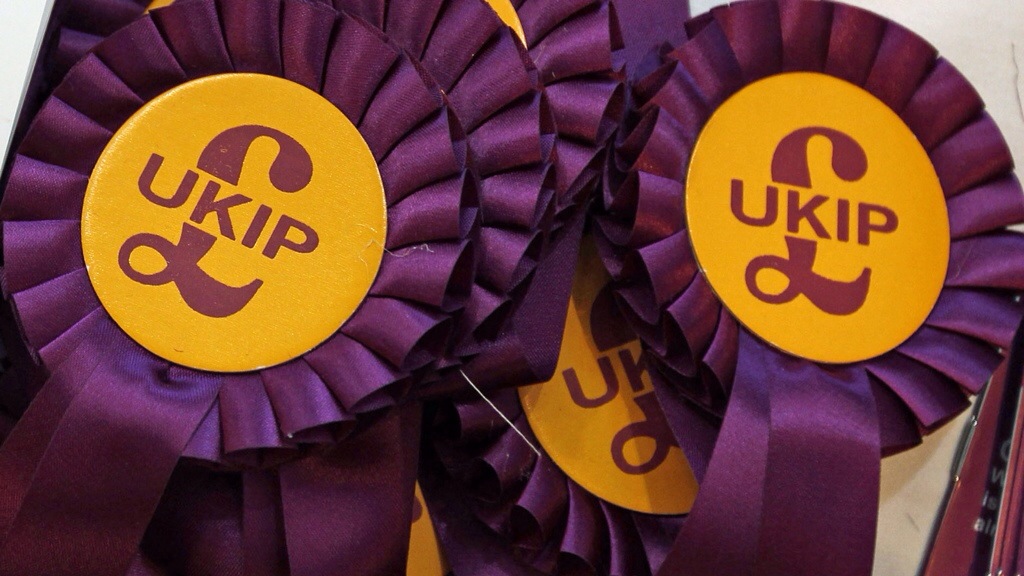With just a couple of months to go before the Euro elections, a new book co authored by a University of Manchester lecturer in politics has revealed that almost of third of British voters are potentially receptive to the policies of UKIP.
The study, Revolt on the Right: Explaining Support for the Radical Right in Britain, by Dr Robert Ford, from The University of Manchester, and Dr Matthew Goodwin Associate Fellow, Chatham House, found that UKIP support is fuelled by a combination of three motives: Euroscepticism, hostility to immigration and intense dissatisfaction with the established political class. UK
Around 30% of British voters are Eurosceptic and opposed to immigration, or Eurosceptic and politically dissatisfied, while 20% hold all three ‘UKIP-friendly’ beliefs. This means around 30% of voters are potentially receptive to UKIP, roughly twice the level of support UKIP received in 2013, their best year to date.
The authors also conclude that UKIP’s potential has increased since the crisis: the share of voters who hold these UKIP-friendly beliefs has increased, as has the number of voters who are strongly dissatisfied with how the main parties have performed on immigration, as well as the financial crisis.
Dr Robert Ford, says: “UKIP are currently winning over one voter in ten but their potential far exceeds their current support in the polls by a margin of three to one. This revolt has been a long time coming, but may have a long way to run”.
The book finds that since 2010 UKIP’s rise in the polls has come by deepening not widening their support among the ‘left behind’. “UKIP have ‘doubled down’ on their core, working class vote, not spread their appeal more widely across society”, says Dr Ford.
While UKIP voters are intensely Eurosceptic they are also driven to the party by their strong concerns over domestic issues on which the Coalition government and main parties have little control: they are “Brussels plus voters” — strongly Eurosceptic but also strongly hostile to immigration, and more likely than others to feel as though they have no voice in politics.
“Euroscepticism gets Farage through the door”, says Dr Goodwin, “but to close the deal he needs to also tap into voter concerns over immigration and their dissatisfaction with our mainstream politics”. UKIP voters are especially angry about how both Labour and the Conservatives have managed immigration.
UKIP are also benefitting strongly from David Cameron’s unpopularity among core UKIP voters. Since 2010, Cameron’s ratings among Eurosceptic, anti-immigration and politically dissatisfied voters have slumped: he is a significant recruiting sergeant for UKIP, although dislike of Ed Miliband is also significant –Farage is winning over voter dissatisfaction with the entire political class.
However, Revolt on the Right also shows Farage and UKIP face challenges.
Dr Goodwin says: “UKIP’s problem going forward is that they have little appeal to university graduates, the young or to ethnic minorities. They also face an electoral system that stacks the deck against new entrants”. At European Parliament elections, UKIP have managed to add to their core left behind base by persuading better off, middle class Conservatives to “strategically defect” to the UKIP. These voters use UKIP as a vehicle to express specific discontent over the EU and usually return to the Conservatives at Westminster elections.
“A key question facing Ukip in May”, says Dr Ford, “is whether they can sustain the loyalty of these defectors who add an important layer to their core, left behind, working class base.”
Revolt on the Right: Explaining Support for the Radical Right in Britain (Routledge), is by Drs Robert Ford and Dr Matthew Goodwin and published on March 12.
The authors examined over 100,000 British voters, including 6,000 self-identified UKIP supporters and extensively interviewed former and current activists, including Nigel Farage, Robert Kilroy-Silk and UKIP’s founder Professor Alan Sked.







